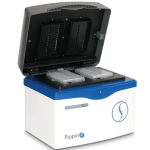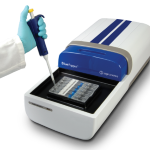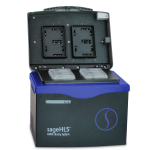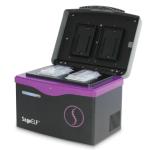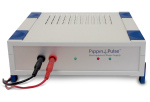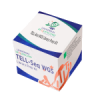IL-10 Produced by Induced Regulatory T Cells (iTregs) Controls Colitis and Pathogenic Ex-iTregs during Immunotherapy
December 2012
Authors:
Erica G. Schmitt, Dipica Haribhai, Jason B. Williams, Praful Aggarwal, Shuang Jia, Louis-Marie Charbonnier, Ke Yan, Rachel Lorier, et al.
Info:
The study included sequencing of the T-cell receptor. For this sequencing, the authors used Ion Torrent platform. The Pippin Prep was used for size-selection as per the standard Life/Ion library construction protocols.
Citation:
J Immunology 189(12): 5638-5648: December 2012
Bactobolin Resistance is Conferred by Mutations in the L2 Ribosomal Protein
December 2012
Authors:
Josephine Chandler, Thao T. Truong, Patricia M. Silva, Mohammad R. Seyedsayamdost, Galvin Carr, Matthew Radey, Michael A. Jacobs, Elizabeth H. Sims, Jon Clardy, E. Peter Greenberg
Info:
Authors were searching for cause of resistance to antibiotic Bactobolin. Performed Illumina paired-end sequencing on resistant strains. Library construction used size-selection of library on Pippn Prep. Discovery of mutation was straightforward for two of four strains. Other two strains harbored a three base insertion which was not recognized in the initial Illumina sequencing.
Citation:
mBio 3(6):e00499-12: December 2012
SATB1-mediated functional packaging of chromatin into loops
November 2012
Authors:
Terumi Kohwi-Shigematsu, Yoshinori Kohwi, Keiko Takahashi, Hunter W. Richards, Stephen D. Ayers, Hye-Jung Han, Shutao Cai
Info:
Among other things, this paper outlines methods for mapping all DNA binding sites for a global chromatin organizing protein, SATB1. Recombinant HIS-tagged SATB1 protein is incubated with sheared genomic DNA, SATB1 with bound DNA is captured on magnetic HIS particles, and then DNA libraries are prepared from the particle-bound DNA. Illumina library construction is used, with size selection on the Pippin Prep (150-500bp).
Citation:
Methods: November 2012
Use of Four Next-Generation Sequencing Platforms to Determine HIV-1 Coreceptor Tropism
November 2012
Authors:
John Archer, Jan Weber, Kenneth Henry, Dane Winner, Richard Gibson, Lawrence Lee, Ellen Paxinos, Eric J. Arts, David L. Robertson, Larry Mimms, Miguel E. Quinones-Mateu
Info:
Comparative study of four NGS platforms (454, Illumina, PacBio, Ion) in clinical assay to determine HIV tropism (polymorphisms in HIV env gene). Ion protocol included amplification of 2300 bp gene fragment, random cleavage, endrepair, adapter ligation, size selection at 150 bp on Pippin Prep, enrichment PCR, library quant., emPCR, sequencing on PGM. All platforms worked almost equally well in this study.
Citation:
PLoS ONE 7(11):e49602.
Next-Generation Sequencing for Rodent Barcoding: Species Identification from Fresh, Degraded and Environmental Samples
November 2012
Authors:
Maxime Galan, Marie Pages, Jean-Francois Cosson
Info:
Genotyping rodent strains using targeted NGS of informative regions of cytochrome b and cytochrome c oxidase 1 genes. PCR fragments ~250 bp in length were generated (with barcoded primers) from a variety of sample types, pooled, and size selected as a pool on Pippin Prep to remove non-specific PCR products.
Citation:
PLoS ONE 7(11): e48374. doi:10.1371/journal.pone.0048374
